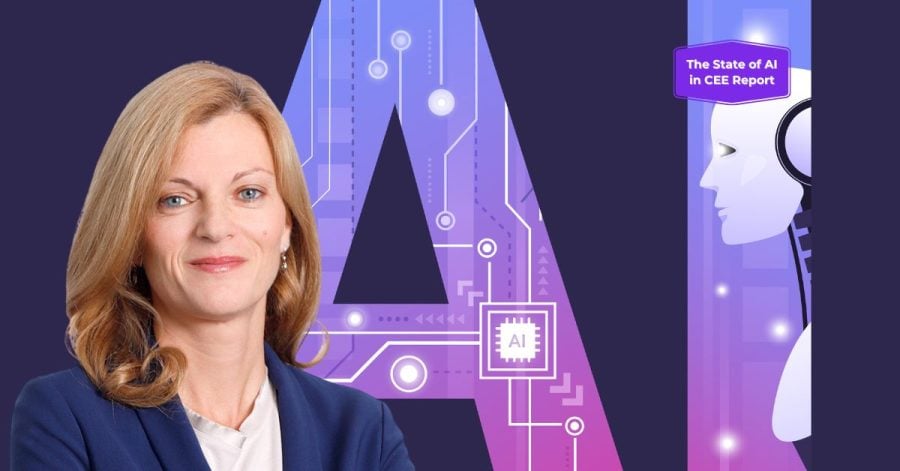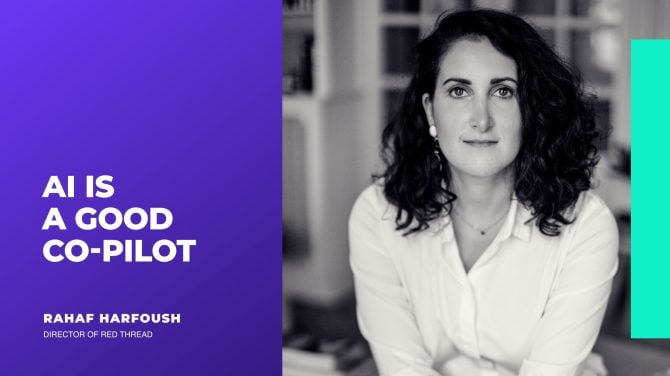With a formidable experience in investment banking, private equity and new business ventures, BrightCap Venture’s managing partner Elina Halatcheva has now set her sights on deep tech, AI, and machine learning as a focal investment for her fund.
In an interview with The Recursive, Halatcheva discusses the current AI investment landscape for VCs across the CEE, what are the industries where the emerging technology can have its biggest impact, and how tech companies can keep up with the tempo of integrating AI.
The following interview was conducted as a part of The Recursive’s “State of AI in CEE” report. Download the full report with insights from 40+ experts and an analysis of 900 AI product companies from CEE here.
The Recursive: How would you describe the current landscape of AI investment in the VC industry in CEE? How would you compare that landscape to Western Europe?
Elina Halatcheva: Naturally, together with the rest of the world, we see an increased activity in AI investments in CEE. More new companies based on AI/ML models are being born, e.g., intelligent virtual assistants, AI-powered marketing tools, logistics and shipment automation systems based on AI, 3D modeling, health-tech AI assistants, smart homes/devices etc., as well as other deep tech companies that empower organizations to build robust and trustworthy AI models. Many existing businesses are also rushing to augment their offering with additional AI capabilities – a well-known example of this is UiPath RPA applying AI to make better predictions, handle variability and interpret unstructured content.
Western Europe has seen a number of very big AI deals recently, notably that of the 4-week old French Mistral whose €105m round valued the company at €240m. Earlier in the year, DeepL (from Germany) which uses neural networks to translate texts and full documents raised a round to fuel AI R&D which valued the company at €1bn.
Still, the US is far ahead with $25bn invested in AI since the beginning of the year, compared to only $4b in EU, UK and Israel.
How has the AI investment landscape evolved over the years? What are the main challenges and opportunities you see?
AI has existed for around 50-60 yrs, starting with small models built with rules on small data sets (e.g., predicting what’s in an image). In 2013-15, the Deep Learning era started with training large learning systems to approximate how the brain works on GPUs (graphical processing cards). A few years later came the so-called Large Scale AI era with significantly bigger AI models, giving rise to generative AI models (e.g., OpenAI, DeepMind, etc.), etc.
There’s an unimaginable realm of opportunities created by the most recent AI wave – from dramatically improved operational efficiency to better (and personalized) healthcare, to cheaper and cleaner energy.
The main challenge remains the lack of comprehensive regulation and its enforcement (see more below).
How many companies in your portfolio develop and sell AI-powered software or hardware products? Can you give examples of the most successful ones and why do you consider them as exemplary?
Deep-tech/AI/ML has been a focal investment theme for our fund, so we have ~50% of our portfolio or 9 companies that develop AI-powered software in various industries. For example:
- Woom/Apricity use an AI-based fertility predictor to identify key success factors in fertility treatment based on the patient’s type of infertility and age
- Enview (exited to Matterport) uses custom-trained AI/ML models for object classification and digital twinning
- Amygda uses generative AI to predict damage and prevent downtime for industrial assets
- Efemarai is an ML testing and debugging tool
- SessionStack provides an AI tool to condense long user journeys into short summaries and help their customers improve the user experience
- Columbo AI is an AI-assisted tool that identifies lumbar spine pathologies in MRI scans
- Kardi AI uses an artificial neural network to monitor and detect heart arrythmias
- Augment is an AI/ML enabled e-sports analytics tool
The AI/ML foundation that these companies are built upon helps customers in various industries become more efficient, decrease inaccuracies and costs and ultimately become more successful.
For example, Apricity’s fertility prediction algorithm increases the chances for a woman to get pregnant by providing personalized insights and advice. Amygda’s smart maintenance software saves big industrial clients costly disruptions, damages and maintenance costs. Columbo’s AI reduces radiologists’ reading time and increases accuracy in diagnosis. Kardi’s AI saves lives by a timely detection of heart problems.
How do you evaluate the AI capabilities of a startup when considering an investment? What role does AI play in your investment strategy at BrightCap Ventures?
We believe that AI will become a mainstream, foundational ingredient in most tech companies, if they want to stay competitive. The modus operandi of the future.
We have already invested half of our portfolio in such companies as we have been strong believers from the beginning and will continue to scout for such companies. We are also well aware that there are a lot of claims of AI use and application and a frenzy to go in at any cost but we’ll remain reasonable and diligent in our approach.
How do you support your portfolio companies in implementing and optimizing their AI strategies? Can you share an example of a successful AI implementation in one of your portfolio companies?
As mentioned earlier, we believe that AI/ML make businesses more efficient and competitive and fully support our founders in implementing such models. For example, SessionStack recently added SessionStackAI which summarizes long user journeys into short sessions with red flagged problematic areas. It then pairs the short summary with recommendations on how to improve those areas. This saves a tremendous amount of time – a 3 hour user journey can be condensed to less than a minute with clear actionable suggestions on how to refine the user journey.
How do you assess the potential impact of an AI startup or company on society and the economy?
We always try to quantify the impact – firstly, because we’d love to see the size and significance of it and secondly, because often it makes it easier to determine the price at which you can sell the product to the end customer.
For many of our existing AI/ML start-ups, this impact is measurable, especially those in health-tech. For example, women who were able to get pregnant (Woom/Apricity), lives saved (Kardi.ai), geohazards identified and natural disasters prevented and responded to (Enview), disruption costs saved (Amygda), e-sports games improved/won (Augment).
What are some of the biggest challenges that AI innovators from the CEE region are facing during the development of AI-powered research, products, and services?
I think we are blessed with a smart population of ambitious and talented young people. However, we lack systematic governmental support (I am speaking specifically for Bulgaria but I believe this applies to other neighboring countries), both in terms of policies and funding for education and innovation in this area. For example, within our portfolio, we have a number of AI/ML experts but the majority of them have studied and worked abroad (with degrees from MIT, Stanford, University of Edinburg). We are lucky to at least have INSAIT (kudos to Martin Vechev) and other privately funded academic institutions like Telerik and SoftUni but those are not enough.
Other than that, there are limitations with regards to datasets (to train the models) and the ever increasing processing power/GPUs (to build and train those AI models). I recently read that Index has partnered w/ Oracle to help its portfolio companies access GPUs by pre-committing and paying the bills on behalf of the start-ups. (Note: Index has $13bn in AUM)
Where do you see the biggest opportunities for AI startups and companies in the next 5 years?
There are endless applications of AI in possibly every industry and sphere of our lives.
I see three main themes for future advancement in: 1) personalization of content/products/services (e.g., for e-commerce, health-care, education, entertainment, etc.), 2) optimization of processes (e.g., in manufacturing, supply chain & procurement, retail, banking and insurance, energy, software development, customer service and HR, etc.) and 3) new discoveries (autonomous driving, drug discovery, text/music/art creation, code generation).
How do you address ethical considerations when investing in AI startups?
We always make sure that our companies adhere to data protection and privacy regulations (i.e., they don’t use or disclose customers’ data without explicit approval) and don’t run the risk of copyright infringement (i.e., using third-party data to train algos without prior approval or licensing).
What impact do you think AI regulations will have on the VC industry and AI startups?
I think AI regulations are critical for a safer world. Preventing AI from racing beyond human control (the most obvious threat is military application, but not only), cognitive manipulation of people, collecting and disclosing private and sensitive information, etc. Unless regulations are unwarranted, I actually believe that they will be mostly beneficial.
Regulations are also necessary because the development and training of large-scale models is associated with high costs and that could lead to a concentration of AI capabilities in the hands of a few corporations or governments with large pockets. This, in turn, would raise concerns about accessibility, fairness and the potential misuse of AI technologies.
How would you evaluate cooperating and networking with other stakeholders to advance AI technology in the CEE region? Can you give any specific examples?
We always try to combine forces with investors and other industry stakeholders alike, for every company that we invest in, not only AI-powered. Experienced co-investors (and their founders) can bring valuable knowledge and help new founders avoid fatal mistakes and expedite their progress. Traditional industry players can validate the need for a more automated and intelligent solution based on AI and become future customers. They can also provide the data (adhering to privacy policies, of course) to train those AI algorithms. We have a large network of partners (who are industry experts) that we engage with on both of these when we see such an opportunity.
For example, our femtech co. Woom had partnered with University of Navarra to provide them with images of a biometric fertility parameter to train Woom’s AI algorithm. Another one of our health-tech companies, Columbo was able to collect the largest annotated database of lumbar spine MRIs through collaboration with radiologists, who also became the first pilot users of the software.
In your role as a Managing Partner at BrightCap Ventures, how do you see the integration and application of AI technologies transforming the decision-making process, risk assessment, and overall strategy within the venture capital industry?
We already see a trend in this direction. VC investors are increasingly relying on AI to contribute to deal sourcing, investment decision-making, data analysis and portfolio management.
For example, NGP Capital has developed a proprietary AI tool that tracks around 300 parameters (and 700,000 companies) to identify suitable investment targets. It took them 18 months to develop with around 30% of their opportunities arising from the system (expected to grow to 90%).
Correlation Ventures uses their proprietary AI tool to generate a comprehensive scoring system to accelerate and precise the investment decision making.
This, of course, makes sense for larger funds operating in big geographies with a lot of data and investment opportunities. And, of course, having the human bandwidth and deep pockets to develop such an engine.








